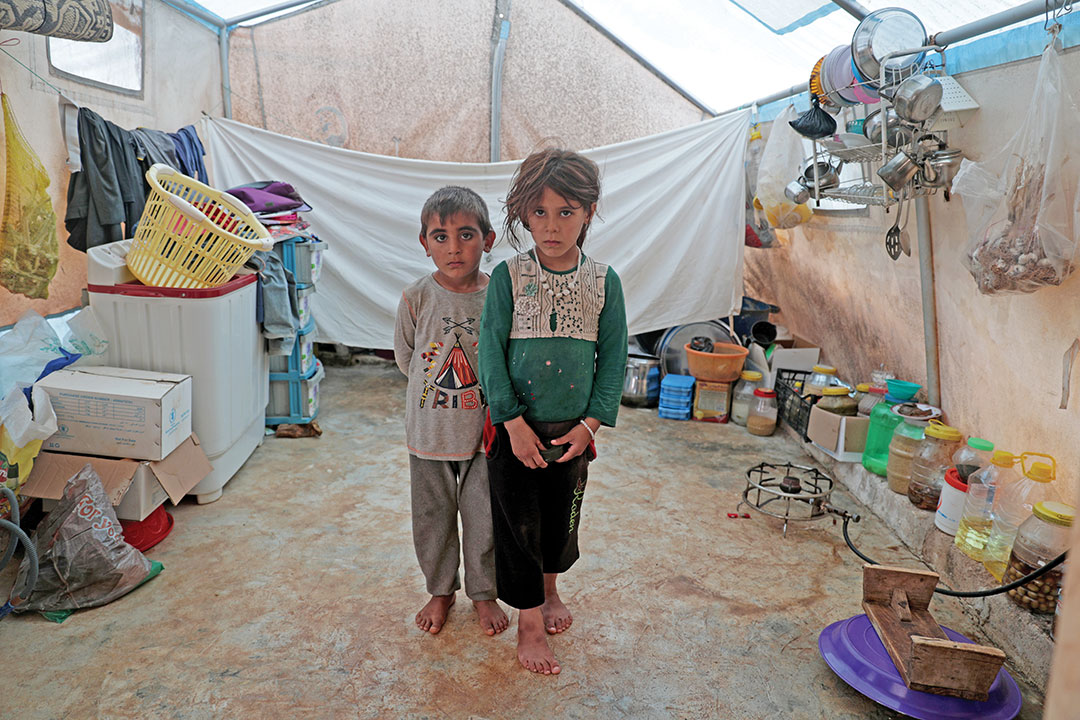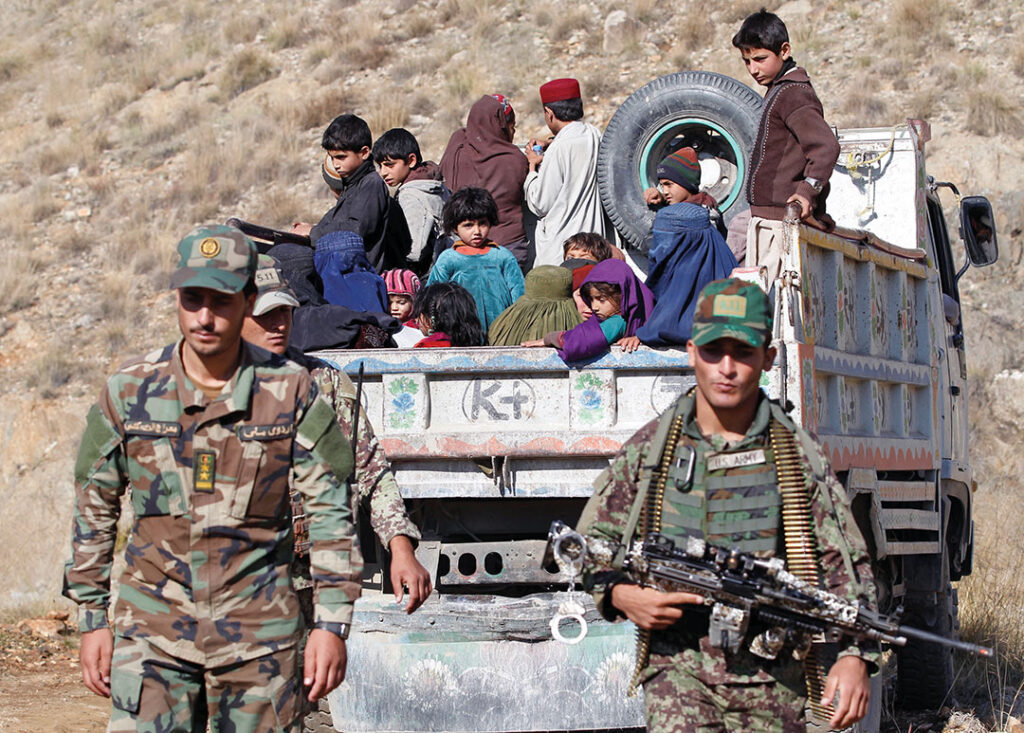Children of terrorist fighters trapped in refugee camps provide fertile ground for terrorist recruitment
SAUDI MAJ. GEN. ABDULLAH GHANEM AL-QAHTANI
ISLAMIC MILITARY COUNTER TERRORISM COALITION
Photos by Reuters
Islam and Muslims are maligned and wrongfully accused of all manifestations of terrorism. The bitter reality is that some followers of Islam fall victim to terrorism, extremism, militancy, enmity and racism stemming from cross-border sectarian policies that instrumentalize religion to realize political goals. Such conflict is the inevitable corollary of terrorist organizations threatening the lives of Arabs, Muslims and others around the globe.
The whole world is in a state of relentless conflict with terrorism, its organizations, ideas, media and machinery. Against such a backdrop of belligerency, people remain perplexed why substantial funding is continually funneled to terrorist organizations. The magnitude of such financing has become the backbone and bedrock of terrorism. The true financiers of terrorism are still immune from prosecution regardless of the substantial efforts made to dry up the sources of financing terrorism, including money laundering, human trafficking, drug trafficking and smuggling, while being in control of energy sources and treasuries in some countries.
Although cracking down on terrorism at all levels is taken for granted, leaders and governments rarely use soft power to confront terrorists before using military options. Simply put, countries, along with their authorities and institutions, rarely adopt deterrence tools before resorting to armed force, which is deemed most appropriate to achieve urgent and fruitful results in defeating terrorist organizations and their affiliated cells. Although it makes sense to confront such implacable enemies perpetrating appalling atrocities, horrendous massacres and large-scale destruction, this has not been enough to eradicate terrorism once and for all.
Given the critical importance of defeating terrorism, we well recognize and understand the compelling logic of the Islamic Military Counter Terrorism Coalition (IMCTC), which laid down its strategic mandate according to projects based on practical initiatives concerned with nurturing a nonviolent ideology, programming, media broadcasts and cooperation with countries and organizations of the world to dry up financing of terrorism. The IMCTC has not turned a blind eye to the military domain, which includes supporting IMCTC member countries with counterterrorism training and logistical programs in addition to supporting any joint operations to achieve stability and security.

It is true that great international efforts have been made and are still being made to overcome terrorism. However, most indicators suggest this won’t be achieved soon; rather, everyone is faced with a strange and dangerous situation. Although terrorist organizations are temporarily in full retreat, they are highly resilient, can rapidly adapt, morph and mutate, and can reposition themselves innovatively. Such tactical metamorphosis, so to speak, is a major challenge for the intelligence services tasked with countering terrorism.
While we recognize and agree that the war against terrorism is legitimate for all countries, the world’s leading industrial nations — as encompassed by the Group of 8 (G8) — are supposed to assume responsibilities much more broadly, including the use of military, financial, security and information resources. The reason is that the G8, through their industry, giant companies, information and technical advancements — especially in cyberspace — have unwittingly created free spaces and opportunities for terrorists. Terrorist groups can use communications networks to recruit, train, communicate and carry out operations. Such availability of cyberspace has become an ongoing challenge of catastrophic dimensions in the short and long term for all communities.
If we go beyond the successes notched up, or the crushing defeats suffered, at the international level while countering terrorism, thwarting terrorist plots and blocking sources of financing, the Arab and Muslim worlds still suffer from dangerous societal problems that could reverberate for generations if the international community does not address them directly and promptly.
A lurking menace is the emergence of multiple generations of underaged children of terrorists who met their demise in the Levant, Iraq, Africa and other conflict zones. Such “time-bomb” children have no identity. They have not been integrated into peaceful civil society. They have been indoctrinated to hate and seek revenge against all those who reject the ideologies of their parents. This is no surprise because they were birthed in the hotbeds of terrorism, their mothers joining militias and terrorist groups and marrying terrorist fighters willy-nilly. These generations were exposed to genocidal massacres and exploited as cannon fodder on battlefields.
Since terrorist organizations have not been completely eradicated across the region, the main body of these organizations, which will gradually regain momentum, depends on the recruitment of boys and girls to form a mercenary army with a single affiliation: absolute loyalty and full readiness to fight tooth and nail for these organizations. Thousands of male and female young people are vulnerable to recruitment, seeing their parents, who abandoned them to the terrorist cause, as examples to be followed rather than rejected. Against a backdrop of familial loss, such generations represent imminent threats, duplicating their parents’ behavior and breathing new life into terrorist movements.
A study released in 2019 by Jessica Trisco of the American Enterprise Institute, titled “Tackling Terrorist Exploitation of Youth,” suggests that young people represent a vital source of support for many terrorist organizations. Of the 40,000 Daesh members once present in Iraq and Syria, 12% were under 18 years old. There were no fewer than 5,000 children — in addition to about 800 babies born to foreign terrorist fighters — in the territories once controlled by Daesh from April 2013 to June 2018.
The overall number of children born to terrorists in those territories could be even higher, given that terrorists married at a high rate, recruited women and promoted the rape and kidnapping of female minors.
The large number of children born to parents in terrorist organizations shows the magnitude of future threats, which can stem from recruiting such children in a different way, given the lack of international attention to integrate such children into their communities. These children are potential time bombs, so to speak, in their communities.
A valid question remains unanswered: What to do about thousands of children born to parents in miserable refugee camps accommodating thousands of residents rendered helpless by terrorism and politics in their home countries? Sadly enough, they have also given birth to generations of children in the worst environments, some of which are uninhabitable. They have grown up deprived of education, homeless and stateless. They are ostracized living among foul-smelling sewage sludge running through an uncivilized and inhuman environment.
Admittedly, the birth rate increases in such adverse circumstances, stigmatized as they are by lack of institutional work, formal education and a decent human existence. Through such a terrible environment, generations are doomed to trudge and suffer in the shadow of violence and oppression in refugee camps, lacking a sense of belonging. Such generations will remain unintegrated and stick out in safe and civilized communities seeking knowledge-based development and prosperity. Such a reality makes it easier to recruit them as terrorists, or they will possibly be exploited by entities that support terrorism to mobilize public support for those movements.
Against such a backdrop of uncertainty, the world will remain trapped in a vicious circle, snared in a long-term battle against terrorism. The world has failed so far to defuse the causes of terrorism, exacerbated by some countries, while others still turn a deaf ear to such practices. As a result, the Arab and Muslim world is beset by the woes of war.

